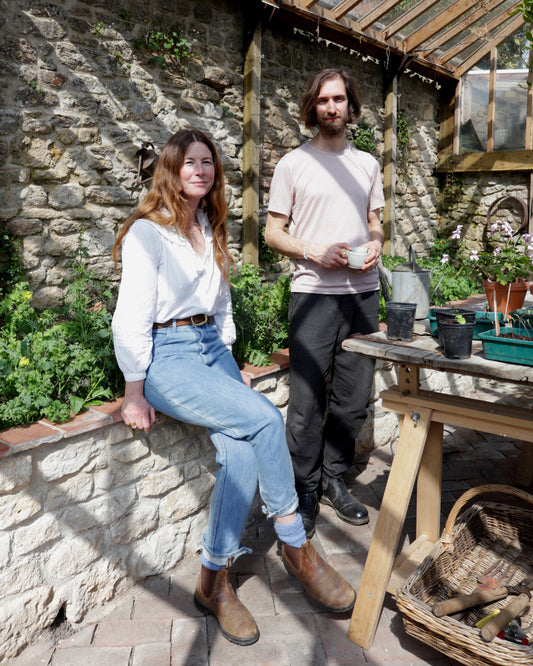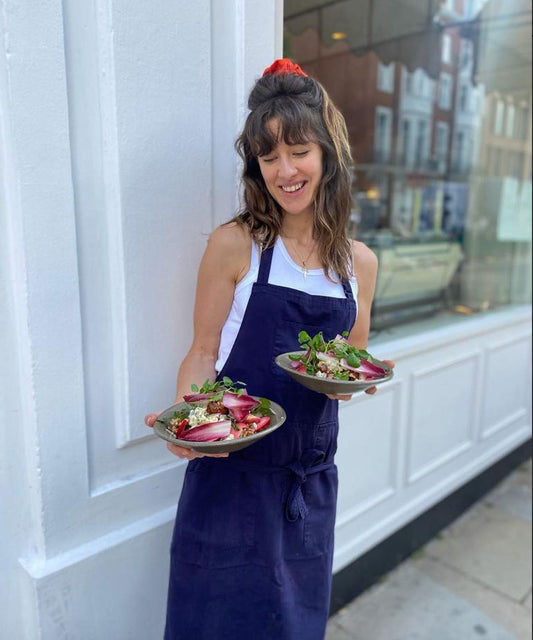At DL, we’re passionate about nature-friendly, organic farming and local food production and for Earth Day 2025, we’re donating £10 from every order to the Freshford Community Farm Project.
This initiative is especially close to our hearts as Jake, our Finance Director and husband of our founder Georgia, is one of the project’s founding members. We sat down with him and Tania Pascoe, another founding member, to learn more about the project and their passion for local, nature-friendly farming.
Tell us a bit more about the community farm initiative?
Tania: We hope to start a market garden in our community and for our community - two neighbouring villages, Freshford and Limpley Stoke on the Somerset Wiltshire border. We want the farm to be a real haven of abundance, producing nutritious and affordable, locally-grown fruit and vegetables. Central to the project is nature-friendly farming and this will ensure that our community, the growers, the land and our local biodiversity can all thrive.
Jake: As Tania mentioned, the inspiration behind this project is deeply rooted in bringing the community together through growing food. We plan to hire an experienced head grower to help ensure the farm’s long-term success, both commercially and environmentally. They will be supported by community volunteers in both the growing and governance of the farm. We also plan to include a social space for events and gatherings, making the farm a real hub for the community. Our vision is to establish a thriving and beautiful grassroots farm that grows fruit and vegetables in harmony with nature and supports greater food sovereignty and independence for the local community.

Why is local, community led food production and farming so important?
Tania: Accessing delicious, nutritious, seasonal and local food, grown with respect for the planet is so much harder than it should be, especially if you want it to be affordable. Most of us don't know enough about where and how our produce is grown or how shockingly nutritionally depleted our veg is today. We are disconnected from the food that nourishes us and nature on which we wholly depend. Local food growing rekindles this connection in such a gentle and beautiful way.
We initially came to the idea of a community farm as a tangible response to the dual climate and nature emergencies' which can feel so overwhelming. Happily, growing hyper-local fruit and vegetables in healthy soil punches way above its weight in terms of the positive impact it provides. Through the farm project we can sequester carbon in our restored soils, reduce climate emissions by eliminating most transport and refrigeration, provide food and habitat for insects and birds, support better health because our produce will be freshly picked and all those vital minerals and vitamins won't be lost when stored for too long.
On top of all this is the community cohesion, the resilience and well-being that comes from community-centred growing. We hope the farm will be a welcoming and joyful place for all residents whether they are simply eating the produce, gardening alongside the head grower, joining a fun learning event or celebrating the harvest at a community feast. That's a lot of good stuff off just a few acres.
Jake: Over the past century, large-scale industrialised agriculture has come to dominate our food system. In the process, many local communities have lost their connection to the land, the seasons, and nature. I believe these connections are essential; not just for our wellbeing, but for a deeper sense of responsibility to the planet and a true appreciation for the food we eat. Small-scale, community-led farming can help to reignite that connection. By making growing and farming more accessible through projects like this one, children who didn’t know that carrots are pulled from the earth or that peas come from pods on a vine can rediscover the wonder and joy of being involved in growing food. I truly believe that small-scale, local growing is the future, and that’s why we wanted to give it a platform this Earth Day.

What is agroecological growing?
Tania: In essence agroecology ensures a healthy, mutually supporting relationship between nature and us and our food. We need good food to live but we can only do this if our natural ecosystems are flourishing and we have a fairer society. Agroecological farming is a set of principles that ensure all the components of this complex web of life are cared for. It covers elements like building soil health, restoring our watercycles, increasing biodiversity as well as focusing on the human and social values such as equity and justice through to the importance of culture and food traditions that reconnect us to the land. When we follow these principles we can become more climate resilient, restore nature and live in a more socially just and kind world.
Jake: As Tania says, the principles of agroecological growing, or farming, cover a wide range of social, economic, and ecological factors. But for me, in its most practical sense, agroecology is about looking to nature first when solving farming challenges or deciding how best to grow food. In other words, it asks: 'What can nature teach us about how to approach this situation?'.
For example, instead of using chemical pesticides to deal with a ‘pest’ insect, an agroecological approach might involve planting a 'companion crop' alongside the main crop. This companion plant attracts predator insects that naturally control the pest population, reducing damage without harming the environment. In this way, food can be grown in harmony with nature, allowing ecosystems to thrive alongside agriculture.
Why is the way in which we grow food so important for our health and wellbeing?
Tania: I love growing, not just for the delicious produce but also because of the mindfulness, nature, social connection and physical activity it gives me. These benefits are well documented but what I have loved learning recently is just how much soil health and freshly harvested food is linked to the nutritional content of our plant foods. Today we need to eat three carrots to get the same nutrition as we would have done from a single carrot 50 years ago and that's because on average our soil is so depleted of the diversity of microbes and trace minerals. A diverse range of edible plants grown in fertile soil, rich in fungal, microbial and organic matter and free from disturbance such as ploughing, chemical fertilisers, herbicides and pesticides directly equates to our nutritional intake, gut microbiome and overall health.
Growing food locally is also beneficial because nutrients start to drop-off once a plant is harvested. If it's grown locally it can be delivered to your fridge that day. Compare this to supermarket veg that is most often grown abroad, harvested when unripe and stored and transported weeks before you get to eat it, it's no wonder that nearly all degenerative diseases are on the rise.
Jake: On top of all the great health benefits Tania mentioned, community farming encourages more time outdoors, with our hands in the soil, which brings so many benefits and enriches the soul. Increased sun exposure boosts vitamin D levels, which supports immunity, improves mood, and can help reduce anxiety and depression. Being in direct contact with the Earth, also known as 'grounding', can help restore the body’s natural electrical balance, reducing inflammation and supporting mental and emotional wellbeing.
What advice would you have for anyone taking their first steps towards starting their own community growing initiative?
Tania: Our community farm project started with a few conversations amongst a few locals and over many shared meals we grew to become an action group and clarified what we wanted to do and why. Getting a committed team of passionate people together, each with a diverse range of relevant skills really helps. We have a super mix of educators, accountants, growers and project pundits on our team.
Next you need to get a good feel for your local market. You might have a great idea but you need customers, the right land and funding. In order to share our idea with the community, get feedback and commitment we had to be very clear on our vision and mission early on. We kicked off our launch with a sociable midwinter feast in the village hall in dreary January. Long tables were set up, tickets with a sliding scale of costs sold and a short but information-packed, visual presentation was given before everyone tucked in to a colourful vegetarian lunch. We showed pictures of what a market garden in the village might look like, including the polytunnels, neat wood-chip paths, long no-dig beds and wildflower pollinator strips - we have tried to anticipate any questions and be really honest on the offering.
You don't need to reinvent the wheel. British regenerative market gardening, although hard work and not financially very profitable, is experiencing an uplifting renaissance and there is great advice and support available. Community Supported Agriculture (CSA) is a tried and tested farming model where the community commits to buying a share of the year's harvest rain or shine. In return they get a weekly box of super fresh and seasonal vegetables. There is a CSA network and they have detailed step by step information on how to start.
Organisations such as Landworkers Alliance, Organic Growers Alliance, Soil Association and so many more brilliant groups all offer essential solidarity, expertise and knowledge. Finally I'd really suggest volunteering, apprenticing or enrolling on a growing course at a local agroecological market garden - nothing beats learning hands on!
Jake: One of the key pieces of advice I’d give is: don’t go it alone. Talk to people in your community and share your ideas. Connections will start to form, as they did for us, and before long, you’ll gather a core group of people who share your passion and bring a mix of valuable, complementary skills.
And on that note, for me, passion is just as important as expertise. You can always bring in expert advice where needed, but without passion, vision, and drive, it’s much harder to get a project like this off the ground.
Also, don’t be afraid to ask for advice from those who are already doing it. There are many great examples of community-led market gardens and growing projects out there, and the people who’ve set them up are usually more than happy to share advice to help like minded projects. There are also excellent organisations — like the ones Tania mentioned — that offer resources and guidance to help you plan and organise your project. I’d also recommend the Ecological Land Co-op’s toolkit, which covers everything from finding land to planning permission to governance, and The Plunkett Foundation for advice on setting up community organisations. You can check them out here: https://communityfarm.land and https://plunkett.co.uk/.










